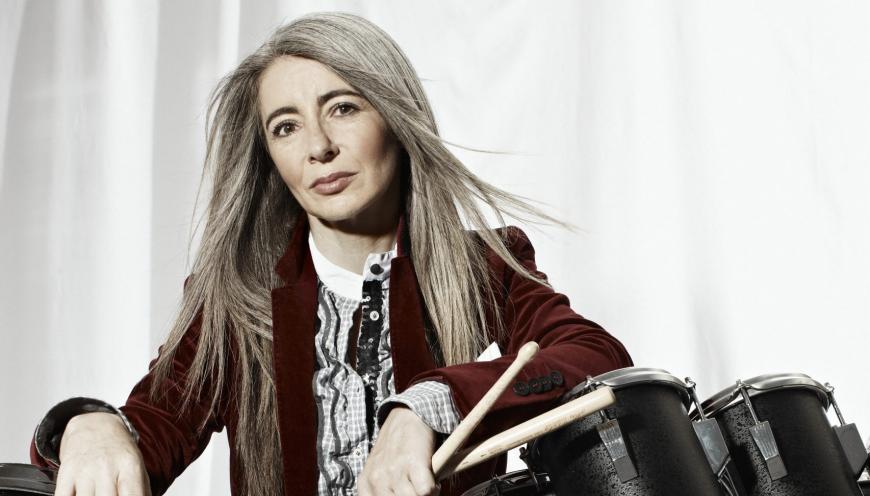
The daughter of a beef farmer and a schoolteacher, percussion superstar Evelyn Glennie never met a struck, thumped, tapped, or scraped instrument she didn’t like. Indeed, she’s been at the top of her field since graduating from London’s Royal Academy of Music in 1985 and finding success as contemporary classical music’s first full-time solo percussionist. That she has also been profoundly deaf since age 12 makes her journey that much more remarkable.
Los Angeles audiences will have the opportunity to learn about Glennie’s life in music on May 11, when she and DJ Kurs, artistic director of Deaf West Theatre, are in conversation at REDCAT, with artist Christine Sun Kim joining the discussion. Building on Deaf West and the Los Angeles Philharmonic’s historic collaboration on a semistaged production of Fidelio (first seen at Walt Disney Concert Hall in 2022 and returning for two performances May 16–17), the REDCAT event explores the creation and reception of music, the innate music of sign language, and the politics of sound.
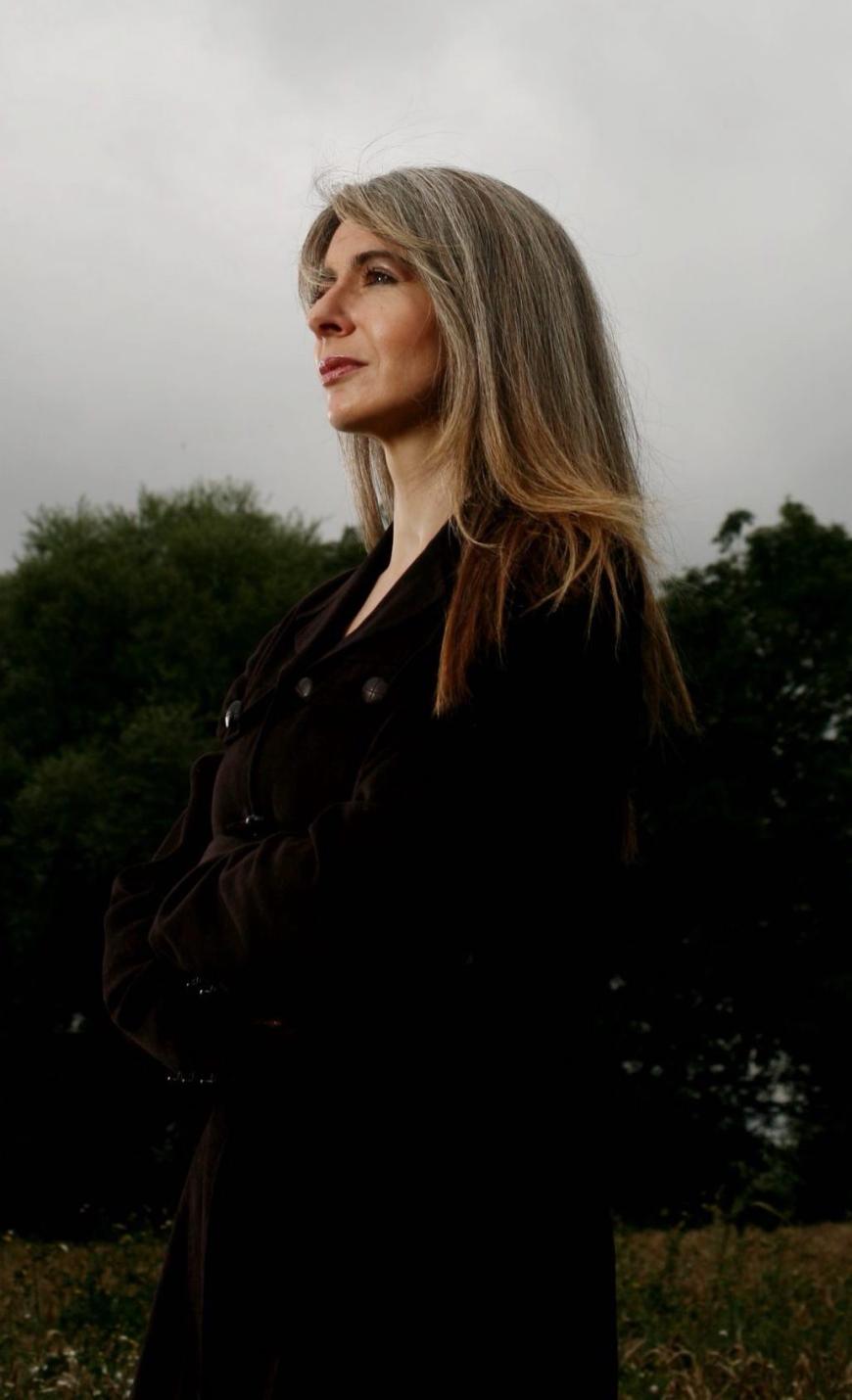
These are topics that Glennie, 58, has been investigating for most of her storied life. As a musically gifted child growing up in the northeast of Scotland, she began studying piano and clarinet when, at age 8, her hearing started to decline. While she became a proficient pianist, she was introduced to percussion four years later, at which point she was completely deaf.
Realizing that her limited hearing would preclude her from playing in an orchestra, Glennie was determined to define a new genre of solo percussion. Paving the way for orchestras globally to spotlight percussionists, she performed the first percussion concerto in the history of the BBC Proms in 1992: James MacMillan’s Veni, Veni, Emmanuel, which was described by Billboard as “a devoutly celestial concerto.”
And the rest, as they say, is history. Glennie, who was made a dame of the British Empire in 2007, has racked up a slew of international awards, including two Grammys and the 2015 Polar Music Prize. In 2023, she became the first percussionist to receive the Léonie Sonning Music Prize. She is currently president of the charitable organization Help Musicians and has been chancellor of Robert Gordon University in Aberdeen, Scotland, since 2021. Continuing her lifelong mission to “teach the world to listen,” she created the Evelyn Glennie Foundation in 2023.
Throughout her career, Glennie has commissioned over 200 pieces from many of classical music’s most prominent composers, including, among others, Michael Daugherty and Margaret Brouwer, as well as worked with the world’s finest orchestras and conductors. She has released more than 40 CDs, ranging from original improvisations and collaborations to percussion concertos and envelope-pushing solo projects.
SF Classical Voice caught up with Glennie over Zoom from England. In a wide-ranging conversation, during which she read closed captions, as well as this writer’s lips, Glennie responded in a beguiling Scottish accent.
What initially drew you to percussion instruments?
I started percussion at age 12. I was exposed to music, as all pupils at school were. I was looking at the school orchestra, and I thought it looked interesting. Seeing the whole orchestra was amazing. I wasn’t obviously concentrating on individual sounds but more the fact that one person was playing a snare, another timpani, another something else. I quite liked the idea — that each person was a soloist but within a section.
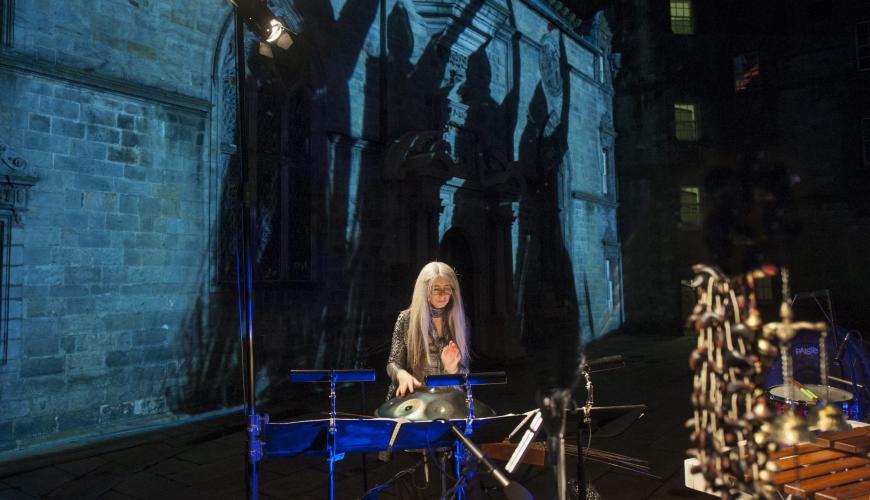
As a student at the Royal Academy of Music, where you knew you couldn’t perform in an orchestra because of your deafness, you were nevertheless resolute in becoming a percussion soloist. What gave you that confidence?
Once I decided to become a full-time musician, I was determined to be a percussion soloist; it felt right for me. I felt I could continue with that and [that] I was going to be supported and have that opportunity at the academy. [The possibility of] having a career as a full-time percussion soloist did not exist [then]. It was difficult to visualize — to stand up in front of an orchestra — [but] I felt determined to make this my career, and I needed a repertory to sustain my career.
Enter James MacMillan and Veni, Veni, Emmanuel, which was written for you. How did that impact your career?
The MacMillan [work] made a huge difference, not just in my career, not just in how people perceived percussion. This was a great piece of music, not just a good piece. It was incredibly satisfying for the conductor, the audience, the soloist. It ticked all of the boxes. It was written by an up-and-comer at the time, James MacMillan, who has excelled in his career. It was an important piece and still holds an important part in the repertory.
Let’s talk about your appearance at REDCAT, a conversation titled “See/Feel/Hear Music.” What can audiences expect?
It’s a speaking engagement, and there’s no playing at all, no instruments at all. It’s entirely a conversation with DJ Kurs and presentations by different people. DJ and I met, and I was invited to do this, to have a mediated conversation. Christine Sun Kim is not part of my presentation, but she will join us at the end to tie our thoughts together.
So, the audience will learn about your life directly from you, as well as your relationship to music from the point of being deaf?
This whole symposium in May is trying to understand how we can better connect: what hearing and listening is. What’s the difference between hearing and listening, and how can the Deaf community share in music-making and the arts in all their forms? It’s going to be an important gathering of different people and different minds to build bridges and find understanding and more common ground.
I think it’s almost redefining what we think our senses are. We’re very good at putting things in boxes, but that doesn’t mean it’s helpful. [For example], the definition of classical music — what does it mean to a 10-year-old, to a 20-year-old? It’s a period in history. It ends up being a confused state of what we’re experiencing. It gets a bit messy.
It’s really about understanding when somebody is passionate about something. It isn’t the disability that dictates the outcome; it’s their passion, their interest. At the end of the day, not all deaf people like music, [and not] all hearing people like opera. It has nothing to do with a disability as such.
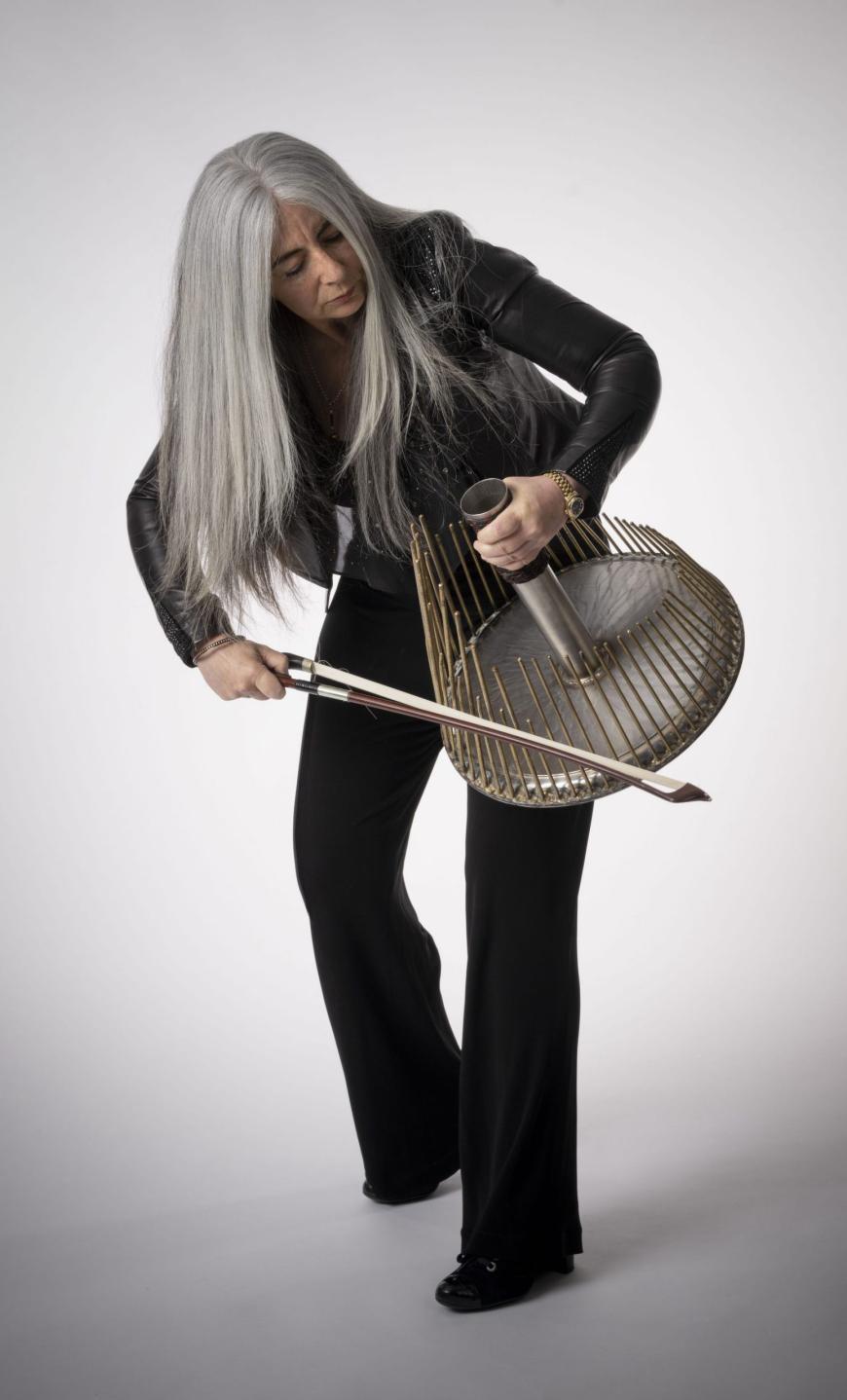
Which brings me to the point of how listening involves more than simply letting sound waves hit your eardrums.
I’m not a medical person, but we do know that sound is about vibration. The body is like a resonating chamber; every part of our body can be affected by sound. [By] opening the body up as a resonator in order to perceive sound, you have a good appreciation of resonance. Even if the ear has stopped hearing something, the body might feel resonance. Listening isn’t only about hearing something. It’s paying attention with the whole body.
To elaborate on that point, you’ve also said that “hearing is a form of touch.”
It is because, as I said, sound is vibration, therefore it’s all about touch. When you think of every musician who creates a sound — the control of a diaphragm, the control of posture, how a bow goes onto a string, a mallet onto a [vibraphone], whatever it is — [there’s a] sense of touch. You have to connect yourself with something. Even if it’s playing a theremin, you’re connected to the air and space.
There are thousands of instruments that you curate in the Evelyn Glennie Collection.
Yes. Over 3,800 instruments form part of the collection; some are small, some are much larger. We have the largest timpani in the world. The collection also has music scores, interviews, recordings, the costumes I’ve worn — as many things that have been part of the journey as possible, [including] different types of artifacts, awards, my schedules, contracts.
Everything has been kept for the past eight years, and we have volunteers who have put this collection together. We’re always looking for more people to be involved. We open it up for tours [that] volunteers organize, [and we] are in the process of trying to find funding for a database that can be open to people around the world for research.
A lot of information from the collection is also loaned to the Evelyn Glennie Foundation — whose mission is to “teach the world to listen.” It’s not a music foundation only. We target the arts, business, sports, the medical side of things. Later this week, I’m headed to a women’s prison to do some work. I’ve also worked with young [caregivers] who focus on young adults with various challenges [and are] trying to get them into the workplace. It’s all about employment, using listening skills — how employers can communicate with different challenges to get [these young adults] into the workplace.
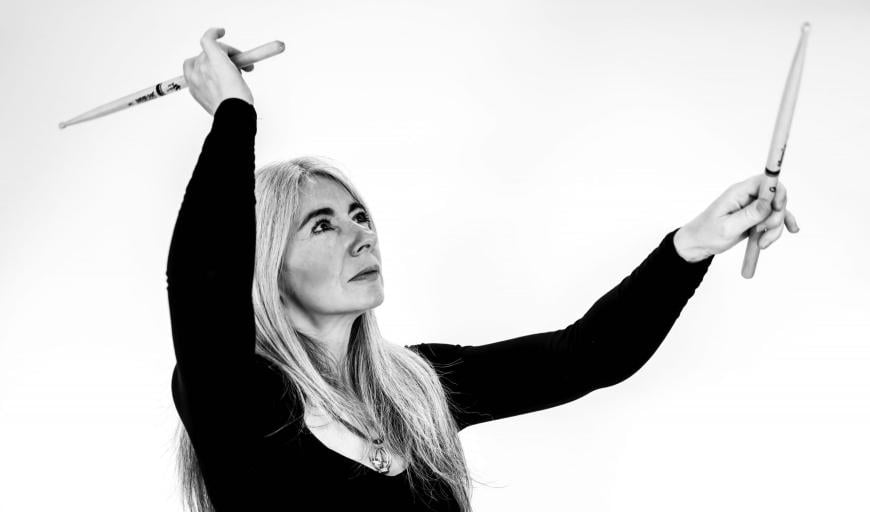
And regarding your mission of “teaching the world to listen,” I’m wondering how we’re doing?
I think probably the events in May will go a long way toward that. I’m not sure if humanity has been the greatest of listeners over history, but nevertheless, we have to keep trying. Listening is quite different to how it was 20 years ago. There’s social media, the internet. We’re reading words more than ever before, more than listening to voices.
Our attention span is shorter, but our capacity to take in information is greater than before, being able to reflect on it and feel it. Listening internally needs much more attention. We’re very good at feeding in information but not that great at letting go of what is within ourselves. As musicians, as artists, we try to feel what is inside of ourselves, even [when] playing a written piece of music. Listening needs a lot of attention.
It’s the kind of thing we draw upon from our hearts in times of crisis. When we had the pandemic, we went to music and art. But as soon as it was over, the arts were shoved down the line again. The arts are the one thing [that] if we didn’t have, we would be a very different species roaming the world. The arts are all about listening.




